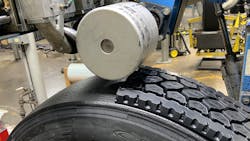How electric vehicles could affect retreads
As I enter the back nine of almost four decades in the tire industry, I’m intrigued by all the attention that electric vehicles are receiving. In certain applications and environments, they will be a viable lower-emission alternative to the gas and diesel engines of today. I think urban operation is best suited for vehicles with limited range and could extend to suburban pickup and delivery services, but outside of that, I just don’t see electrification having a major impact on trucking in my lifetime.
With absolutely no data to support my views on electric vehicles, these are simply my opinions. I don’t know what’s on the drawing board for the latest technology in electric trucks. There could be some super-secret battery/charging technology in development that is a complete game-changer. As we speak, there could be plans for hundreds of thousands of lightning-fast charging stations in rest areas across this great nation. For all I know, electric vehicle technology could be on the cusp of ending the era of the diesel-powered trucks and tractors. If so, I’ll never see it coming.
Nevertheless, electric vehicles are coming. There will be those who choose to dip a toe into the water, those who choose to watch others dip their toes in the water, and those who are going to jump in and hope some unforeseen current doesn’t mysteriously appear and end up pulling them under. Diesel-powered trucks are known commodities. As long as there’s fuel, stuff is going to move.
We’ve learned some recent lessons on overwhelmed power grids that haven’t ended well. Imagine twice the demand or more when trillions of miles are traveled by electric trucks. Reliability has become the number-one priority in the supply chain. Power outages, blackouts, and natural disasters cannot stop trucks from moving the economy.
Given my admitted lack of information on the subject, let’s take a look into the crystal ball and opine how electric vehicles will affect truck tires. We’ve already learned that rolling resistance has a direct effect on range. Owners of passenger electric vehicles who “plus-size” their tires and wheels quickly notice that the wider tire and shorter sidewall results in fewer miles per charge. Translate that to trucks and the low-rolling resistance truck tires and retreads become a more important factor in determining the overall range. Some fleets are already willing to accept higher tire costs for running wide-base tires because there is enough savings in weight and fuel. Will electric truck operators be willing to accept the same with fewer miles per 32nd if it comes with an increased range on a full charge?
It’s also worth some discussion on how an electric truck will impact tire wear with direct-drive motors and regenerative braking systems. Electric vehicle transmissions are already on the market and other advancements will alleviate some of the stress on the tires, but no one can predict how casing construction, tread design, and rubber compound will be affected by a nationwide fleet of electric trucks and tractors. The tire companies have some data based on what’s currently on the road and in testing, but it takes millions of real-world miles to get the most accurate picture of how a truck tire will perform.
That said, I believe the retread industry stands to gain the most from a growing fleet of electric trucks and tractors. Technology aside, the interaction between the road and the tires is different with an electric configuration. There are still millions of diesel-powered vehicles that need tires, so it’s going to take some time before tire manufacturers start building complete lines of specialized tires just for electric trucks. However, the retread industry could react quickly with special compounds and tread designs that account for the differences with electric drivetrain and braking systems. I can envision a day when fleets have a mix of diesel, hybrid, and electric vehicles, where new fuel-efficient low rolling resistance tires are operated on the diesels and the casings are retreaded with compounds specifically designed for the hybrids and electrics.
It makes sense when you think about it. Fleets will still need the diesel-powered units because they have an extended range and don’t have to stop for hours to charge. The electric vehicles have a limited range and need time to charge, so they operate close to home. Retreading has already been proven to provide the lowest possible tire cost per mile, so the first generation of electric trucks may benefit the most from retreads specifically designed for the stresses applied by electric drivetrain and braking systems.
About the Author
Kevin Rohlwing
Kevin Rohlwing is the SVP of training for the Tire Industry Association. He has more than 40 years of experience in the tire industry and has created programs to help train more than 180,000 technicians.
